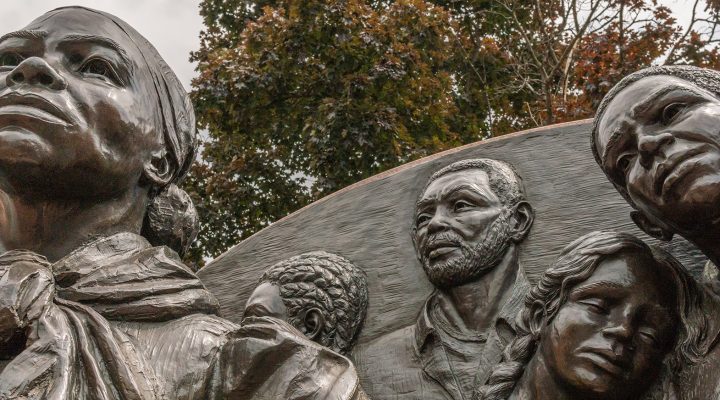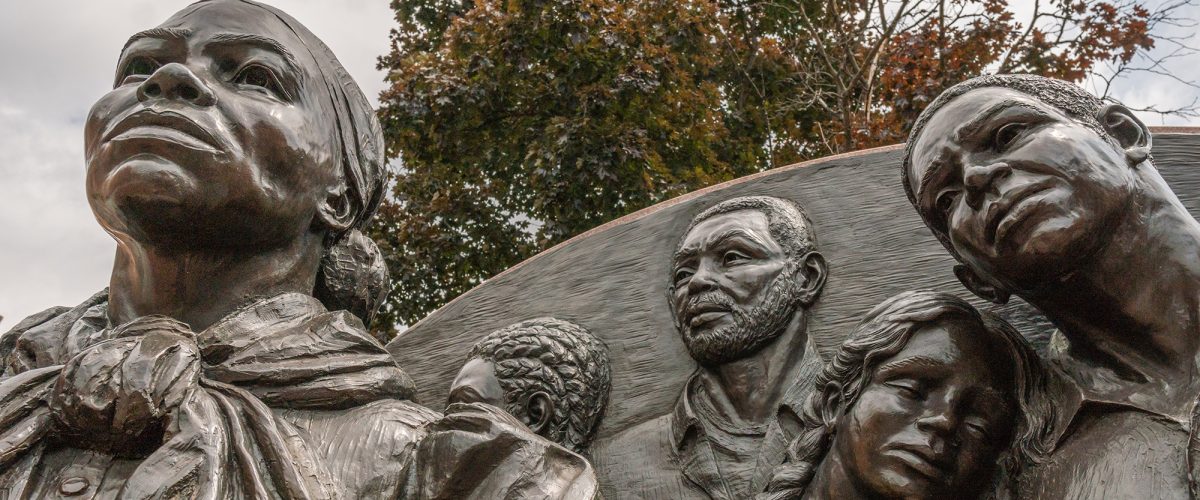O Freedom, O Freedom
Freedom over me
And before I’d be a slave,
I’d be buried in my grave,
And go home to my Lord,
And be free.
I first heard that poignant spiritual (author unknown) in the 1960s, sung by folks like Odetta and Joan Baez at freedom concerts and on records. It was not until the 1990s in a Sunday morning worship at the Sixth Avenue Baptist Church of Birmingham, Ala., that I had opportunity to sing it as a congregational hymn. Our family joined that historic African American-founded congregation in 1993, learning of freedom in ways we’d not known before.
In a 2016 essay for the United Methodist Discipleship Ministries, musicologist C. Michael Hawn writes that it is “unlikely” the emancipated “post-Civil War slave” who composed “O Freedom,” ever saw it written down. Rather, it was “transmitted directly in gatherings with others in similar circumstances of oppression, expressing the deepest hopes and aspirations of a people.”

Bill Leonard
Hawn cites Wesley Seminary musicologist Eileen Guenther’s 2016 book, In Their Own Words: Slave Life and the Power of the Spirituals in which one respondent observed: “During all my slave life I never lost sight of freedom. It was always on my heart; it came to me like a solemn thought, and often circumstances much stimulate the desire to be free and raised great expectation of it. … We always called ‘freedom’ ‘possum’ so as to keep the white people from knowing what we were talking about. We all understood it.”
The words of “O Freedom” move me deeply, but I’ve long hesitated to sing them since I belong to the race of the enslavers. Yet its profound spirituality as both hymn and hope overwhelmed me on April 26 when sung by an amazing trio of African Americans at the installation of Corey Walker as dean of the School of Divinity, Wake Forest University. Hearing that text at worship in this election year, I realized “O Freedom” is a confession of faith we’d all better heed in our own troubled times.
Ponder the spiritual struggle for freedom
Whatever our racial/ethnic/religious origins, we 21st-century Americans should ponder the spiritual, not only to acknowledge the historic struggle for freedom, but in 19th-century parlance, to resist the forfeiture of freedom “that’s a-coming,” aided, tragically, by a certain kind of Christianity. That point was confirmed in an April 24 article in theWashington Post adapted from Rebellion: How Antiliberalism is Tearing America Apart — Again, written by editor-at-large Robert Kagan. It is one of the most reasoned, sobering analyses of our current religio-political crisis I’ve read (and I’ve read many).
“These rights did not derive from religious belief but were ‘self-evident.’”
By “liberalism,” Kagan refers not to the left-of-center movement in today’s politics, but to the formation of this country envisioned and set in motion by the nation’s founders. He writes: “The founders based the republic on a radical set of principles and assertions about government: that all human beings were created equal in their possession of certain ‘natural rights’ that government was bound to respect and to safeguard. These rights did not derive from religious belief but were ‘self-evident.’ They were not granted by the Christian God, by the crown or even by the Constitution. They were inherent in what it meant to be human.”
Kagan notes: “Historians have written about the ‘liberal tradition’ in America, but there has from the beginning also been an anti-liberal tradition: large numbers of Americans determined to preserve preliberal traditions, hierarchies and beliefs against the secular liberal principles of the Declaration of Independence and Bill of Rights.” The founders, he says, knew that established (state-privileged) churches were contrary to those principles because they impinged on that most important of rights, “freedom of conscience,” which was vital to the preservation of liberty, yet a number of states in the 18th and 19th centuries retained all kinds of religious tests for office.
I take some exception with the breadth of Kagan’s assertions since many of the early Baptists contended that God alone was judge of conscience and neither state nor official state-sanctioned church could judge the conscience of the heretic or the atheist. As I’ve noted in this space multiple times, Roger Williams called Providence, R.I., “a shelter for persons distressed of conscience,” and that colony was first to charter full religious liberty for citizens inside or outside Christianity. For Williams, religious freedom (and implicit pluralism) was predicated on Christ’s incarnation.
Misguided ideas
Turning to our current dilemmas, Kagan identifies ideologues such as the Claremont Institute’s Glenn Ellmers who insists that the legacy of the American founders is a “dead end” requiring replacement with a different type of government, along with Notre Dame’s Patrick Deneen and Harvard Law’s Adrian Vermeule, for whom such a government requires a “Christian commonwealth.” They seek a “culture that preserves and encourages order and continuity, and support for religious belief and institutions,” based in statutes that “promote public morality, and forbid its intentional corruption,” thus offering “forthright acknowledgment and renewal of the Christian roots of our civilization.” Such a proposed society provides “public opportunities for prayers,” as well as the “revitalization of our public spaces to reflect a deeper belief that we are called to erect imitations of the beauty that awaits us in another kingdom.”
Kagan also references Sen. Josh Hawley, R-Mo., who insists America is a “revolutionary nation” not because of the principles of the Declaration and not even because of the American Revolution itself, but “because we are the heirs of the revolution of the Bible” that began with “the founding of the (Old Testament) nation of Israel.” Kagan concludes that there could hardly be a statement more at odds with the American Founders’ liberal, ecumenical vision.
“There could hardly be a statement more at odds with the American Founders’ liberal, ecumenical vision.”
Robert Kagan’s work is echoed by NYU historian Steven Hahn in a May 4 opinion piece in the New York Times based on his book, Illiberal in America: A History in which he warns us to resist “imagining that there was a time not all that long ago when political ‘normalcy’ prevailed.” To do that, Hahn insists, is to ignore the fact that “American illiberalism is deeply rooted in our past and fed by practices, relationships and sensibilities that have been close to the surface, even when they haven’t exploded into view.”
Hahn provides a list of contemporary illiberalism that includes “hierarchies of gender, race and nationality; cultural homogeneity; Christian religious faith; the marking of internal as well as external enemies; patriarchal families; heterosexuality; the will of the community over the rule of law; and the use of political violence to achieve or maintain power.”
Robert Kagan sums it like this:
(Patrick) Deneen and (Adrian) Vermeule are often dismissed as mere intellectual provocateurs, but their writings stand out because they have the courage to acknowledge that what they seek is incompatible with the founders’ liberal system. While others conceal their views under a phony fidelity to American liberal principles or claim that what they want accords with the founders’ true intent, Deneen, Vermeule and other anti-liberals acknowledge the country they want, a country subservient to the Christian God, a country whose laws are based on the Bible, cannot be created absent the overthrow of the founders’ liberal and defiantly secular system.
This year
Whatever else, these issues make it clear that this election year the nature of Christianity itself lies in the balance and religious liberty with it.
“This election year the nature of Christianity itself lies in the balance and religious liberty with it.”
As Dean Corey Walker warned in a 2016 essay: “In a deeply stratified and segregated society, political polarization is not just a function of partisanship. Rather, when the world of politics is understood as absolutely discontinuous with the meaning of life and existence, a proper political response must be theological. And it is to the theological that we must critically attend if we are to understand the continuing evolution of America’s unique experience with democracy.
Which brings us back to the question, no, the hope of freedom. I wish Robert Kagan would have referenced colonial Baptists, Quakers and a wayward Congregationalist or two who were anti-establishmentarian for the sake of genuine, freely chosen faith. Likewise, Deneen and others who promote an overhaul of American democracy appear to be increasingly co-opted by the conservative obsession with autocracy now gripping one of the major political parties for which the Heritage Foundation is prepping an authoritarian agenda following election success.
Should that occur, some of us may be singing “O Possum” in whatever shelter for conscience we can find.
Bill Leonard is founding dean and the James and Marilyn Dunn professor of Baptist studies and church history emeritus at Wake Forest University School of Divinity in Winston-Salem, N.C. He is the author or editor of 25 books. A native Texan, he lives in Winston-Salem with his wife, Candyce, and their daughter, Stephanie.
Related articles:
He may be slick, but Ralph Reed is as wrong as ever | Opinion by Mark Wingfield
No, the U.S. Constitution is not based on the book of Deuteronomy | Analysis by Rick Pidcock


